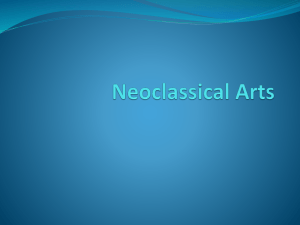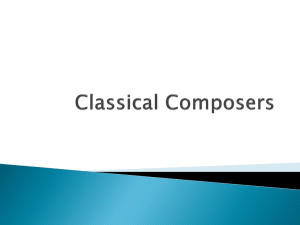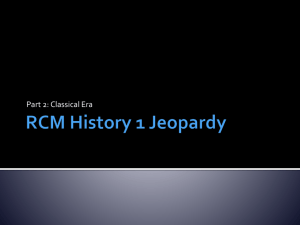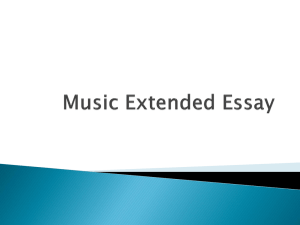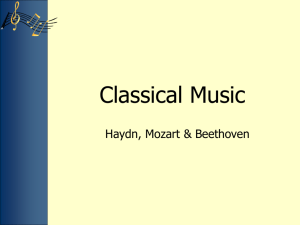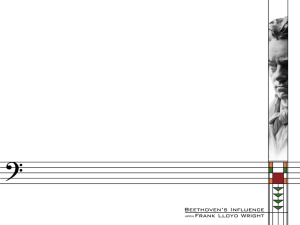Music MUSI 416 Historical Topics in Music
advertisement
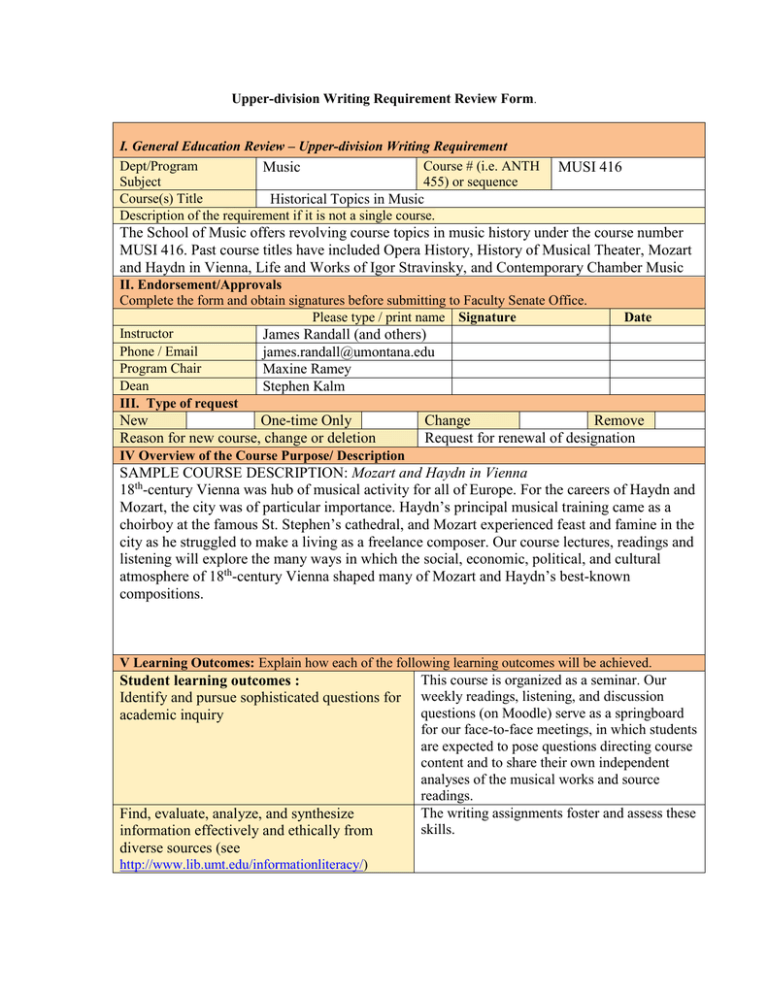
Upper-division Writing Requirement Review Form. I. General Education Review – Upper-division Writing Requirement Dept/Program Course # (i.e. ANTH Music Subject 455) or sequence Course(s) Title Historical Topics in Music Description of the requirement if it is not a single course. MUSI 416 The School of Music offers revolving course topics in music history under the course number MUSI 416. Past course titles have included Opera History, History of Musical Theater, Mozart and Haydn in Vienna, Life and Works of Igor Stravinsky, and Contemporary Chamber Music II. Endorsement/Approvals Complete the form and obtain signatures before submitting to Faculty Senate Office. Please type / print name Signature Instructor James Randall (and others) Phone / Email james.randall@umontana.edu Program Chair Maxine Ramey Dean Stephen Kalm III. Type of request New One-time Only Reason for new course, change or deletion Date Change Remove Request for renewal of designation IV Overview of the Course Purpose/ Description SAMPLE COURSE DESCRIPTION: Mozart and Haydn in Vienna 18th-century Vienna was hub of musical activity for all of Europe. For the careers of Haydn and Mozart, the city was of particular importance. Haydn’s principal musical training came as a choirboy at the famous St. Stephen’s cathedral, and Mozart experienced feast and famine in the city as he struggled to make a living as a freelance composer. Our course lectures, readings and listening will explore the many ways in which the social, economic, political, and cultural atmosphere of 18th-century Vienna shaped many of Mozart and Haydn’s best-known compositions. V Learning Outcomes: Explain how each of the following learning outcomes will be achieved. This course is organized as a seminar. Our Student learning outcomes : Identify and pursue sophisticated questions for weekly readings, listening, and discussion questions (on Moodle) serve as a springboard academic inquiry for our face-to-face meetings, in which students are expected to pose questions directing course content and to share their own independent analyses of the musical works and source readings. The writing assignments foster and assess these Find, evaluate, analyze, and synthesize skills. information effectively and ethically from diverse sources (see http://www.lib.umt.edu/informationliteracy/) Manage multiple perspectives as appropriate Recognize the purposes and needs of discipline-specific audiences and adopt the academic voice necessary for the chosen discipline Use multiple drafts, revision, and editing in conducting inquiry and preparing written work Follow the conventions of citation, documentation, and formal presentation appropriate to that discipline Develop competence in information technology and digital literacy (link) Each writing assignment requires students to critically engage with multiple perspectives and points of view that are presented in assigned readings and listening, from both primary and secondary sources. Students are expected to incorporate those points of view as well as independent research and musical analysis into each of their formal essays. The writing assignment is a shorter research piece (4-5 page program note on a selected piece); The second writing assignment is an 810 page research paper that explores an original thesis. Depending upon the assignment, students submit drafts for peer or instructor review. Students incorporate feedback into their revisions and final drafts. Students are provided with resources I post to Moodle, cover in class, and supplement through handouts. These skills are covered primarily in class, but I also devote discussion forums on Moodle presenting and sharing resources. I also use the music subject area resource guide developed by Tammy Ravas for the Mansfield Library website. Links to helpful resources are posted on Moodle. VI. Writing Course Requirements Enrollment is capped at 25 students. If not, list maximum course enrollment. Explain how outcomes will be adequately met for this number of students. Justify the request for variance. Briefly explain how students are provided with tools and strategies for effective writing and editing in the major. Which written assignment(s) includes revision in response to instructor’s feedback? We discuss these in class and links are provided to resources on Moodle. In particular, I use resources available through the Mansfield Library website and Purdue University Online Writing Lab Research Paper VII. Writing Assignments: Please describe course assignments. Students should be required to individually compose at least 20 pages of writing for assessment. At least 50% of the course grade should be based on students’ performance on writing assignments. Quality of content and writing are integral parts of the grade on any writing assignment. Formal Graded Assignments Program Note: 4-5 pages; Research Paper: 8- 10 pages; Midterm take-home essay exam (~5 typed pages of essays). These Informal Ungraded Assignments assignments comprise 85% of the total course grade. Weekly discussion forums on moodle. VIII. Syllabus: Paste syllabus below or attach and send digital copy with form. For assistance on syllabus preparation see: http://teaching.berkeley.edu/bgd/syllabus.html The syllabus must include the following: 1. Writing outcomes 2. Information literacy expectations 3. Detailed requirements for all writing assignments or append writing assignment instructions Music 416: Mozart and Haydn in Vienna Upper-Division Writing Course: 3 Credits DHC 119: T/TR 5:30-7:00 Spring 2010 Instructors: James Randall E-mail: james.randall@umontana.edu Office/phone: 209 Music Bldg. x6892 Hours: Wed. 9:30-11:00, or by appt. ____________________________________________________________________________________ Pre-requisites: Music majors must have completed both their upper-division recital program and piano proficiency degree requirements, or have the expressed consent of the instructor to enroll in this course. Required Text and Materials Volkmar Braunbehrens’ Mozart in Vienna, 1781-1791. Inexpensive copies are available at Amazon.com and other online vendors. Additional readings will be posted on our Blackboard course supplement. For listening you’ll need to purchase access to the Naxos Music Library (see handout for instructions). Course Description: 18th-century Vienna was hub of musical activity for all of Europe. For the careers of Haydn and Mozart, the city was of particular importance. Haydn’s principal musical training came as a choirboy at the famous St. Stephen’s cathedral, and Mozart experienced feast and famine in the city as he struggled to make a living as a freelance composer. Our course lectures, readings and listening will explore the many ways in which the social, economic, political, and cultural atmosphere of 18th-century Vienna shaped many of Mozart and Haydn’s best-known compositions. Student Goals and Objectives: 1) A familiarity with the current scholarship on Mozart and Haydn, particularly the literature pertaining to their time in Vienna 2) Improved Active listening Skills: in particular, the ability to aurally identify specific musical genres and forms relevant to Haydn and Mozart’s music and to distinguish the individual musical traits of each composer. 3) Developing skills relevant to research and writing in the discipline of music: in particular, fostering digital literacy and a working knowledge of current information technology relevant to our field. Evaluation: Grades will be based upon the following: Paper I (program note) Paper II (original thesis) Midterm Exam Attendance and Participation 30% 30% 25% 15% • Paper extensions will only be permitted with a valid excuse—illness, death in the family, etc. • Students with special needs or disabilities should consult with the instructor for accommodations. Grading scale is as follows A AB+ B BC+ 93-100% 90-92% 88-89% 83-87% 80-82% 78-79% C CD+ D DF 73-77% 70-72% 68-69% 63-67% 60-62% 59% and below Academic Misconduct and the Student Conduct Code All students must practice academic honesty. Academic misconduct is subject to an academic penalty by the course instructor and/or disciplinary sanction by the University. All students need to be familiar with the Student Conduct Code. The Code is available for review online at www.umt.edu/SA/VPSA/Index.cfm/page/1321. MUSIC 416—SYLLABUS (Spring 2010) SCHEDULE/ASSIGNMENTS The assigned readings should be completed by the first class meeting of each week unless otherwise specified. Week 1: Jan. 26/28 Readings: Blackboard Topics: The Classical Tradition: Music in the Age of the Enlightenment Week 2: Feb. 2/ 4 Readings: Blackboard Topics: The Musical Scene in Vienna; Haydn is “Discovered” Week 3: Feb. 9/ 11 Readings: Topics: Blackboard Haydn at Esterhazy; London Symphonies Week 4: Feb. 16/18 Readings: Topics: Blackboard Haydn: Final Years in Vienna Week 5: Feb. 23/25 Braunbehrens, MV: “Preface,” pp. 1-7 Topics: Introducing Mozart: Fact, Fiction, Sources Week 6: March 2/4 Braunbehrens, MV: “Chapter 1: Arrival in Vienna,” pp. 8-47 Topics: Mozart and the City: Making a living as a Freelance Musician Musical works: Various concertos: piano, horn, clarinet Week 7: March 9/11 Braunbehrens, MV: “Chapter 2: The Abduction-1782,” pp. 48-91. Topics: The Turks at Vienna’s Door: Ottoman influence on 18th Century Vienna and in the works of Mozart Musical works: Abduction from the Seraglio Week 8: March 16/18 Braunbehrens, MV: “Chapter 3: At Home with the Mozarts,” pp. 92-141 Topics: Mozart’s relationship with Constanze; Chamber Music Musical works: String Quartets; Piano sonatas Week 9: March 23/25 Braunbehrens, MV: “Chapter 4: Aristocratic and Bourgeois Salons” Midterm Exam Week 10 SPRING BREAK!!!!! Week 11: April 6/8 Course Pack Reading: “Chapter 5: 1782-1785” Topics: Mozart’s Music for Winds Musical works: Wind Serenades, Haffner Symphony Week 12: April 13 Course Pack Reading: “Chapter 6: Mozart and Freemasonry” Topics: Masonic symbolism in Mozart’s music Fieldtrip to local Masonic Lodge Musical works: The Magic Flute NO CLASS APRIL 15 (National Conference for Undergraduate Research) Week 13: April 20/22 Course Pack Reading: “Chapter 7: Vienna 1786-90” Topics: Opera and Society Musical works: The Marriage of Figaro Week 14: April 27/29 Course Pack Reading: “Chapter 8: The Last Year” Topics: Mozart from Medical Perspectives Musical works: Jupiter Symphony, Requiem Week 15: May 4/6 Final Presentations Final: May 11, 5:30-7:00 (We will use this time, if necessary, for final presentations.) SAMPLE ESSAY PROMPT Music 416: Haydn and Mozart in Vienna Essay 1: Program Note/ CD Liner Note Description: Write a program note for a Mozart composition of your choice. Your note must be between 1000-1250 words in length (adhering to strict word limits is typical for published notes). Assume that your target audience is musical educated. In keeping with standard program note practice, source citations within the text are not required. All notes should include the following components: 1) Full title of the work; date of composition; composer and dates 2) Historical context: genesis of the piece, inspiration, etc. 3) Stylistic context: how the piece fits in with other works by the composer and with the music of its era 4) Musical description: something to guide the listener through the piece 5) At the end of the note, you should append a “Further Reading and Listening” section with a short list (no more than 5 sources) of books, articles, websites, or CDs that direct the reader to additional resources for the work (for proper bibliographic citation, see handout on Blackboard) Getting Started: Read the following link for some helpful strategies for researching and writing your notes: http://facstaff.uww.edu/allsenj/MSO/NOTES/WritingNotes.htm Grading: You’ll be graded on the content and accuracy of your note, as well as on the appropriateness of the note for your intended audience. Remember: Your note should be within the 1000-1250 word requirement. Proofread carefully: points will be deducted for errors in spelling, grammar, and punctuation. You should follow the standard editorial guidelines for writing about music (see handout on Blackboard). PROGRAM NOTE RUBRIC Area of Evaluation Content Writing/Mechanics Style Miscellaneous Overview Criteria Comments/Suggestions Were all content areas in the assignment guidelines addressed? 1. 1) Full title of the work; date of composition; composer and dates 2. 2) Historical context: genesis of the piece, inspiration, etc. 3. 3) Stylistic context: how the piece fits in with other works by the composer and with the music of its era 4. 4) Musical description: something to guide the listener through the piece 1) Grammar 2) Punctuation 3) Spelling 4) Organization (clear paragraphs and easy flow) 1) Was the style appropriate in level of formality and language for the target audience? 2) Did you find the note interesting and engaging (again keeping in mind the target audience)? 1) Does the note meet the 800-900 word requirement? 2) Were sources for further reading provided? Were they consistently formatted?
